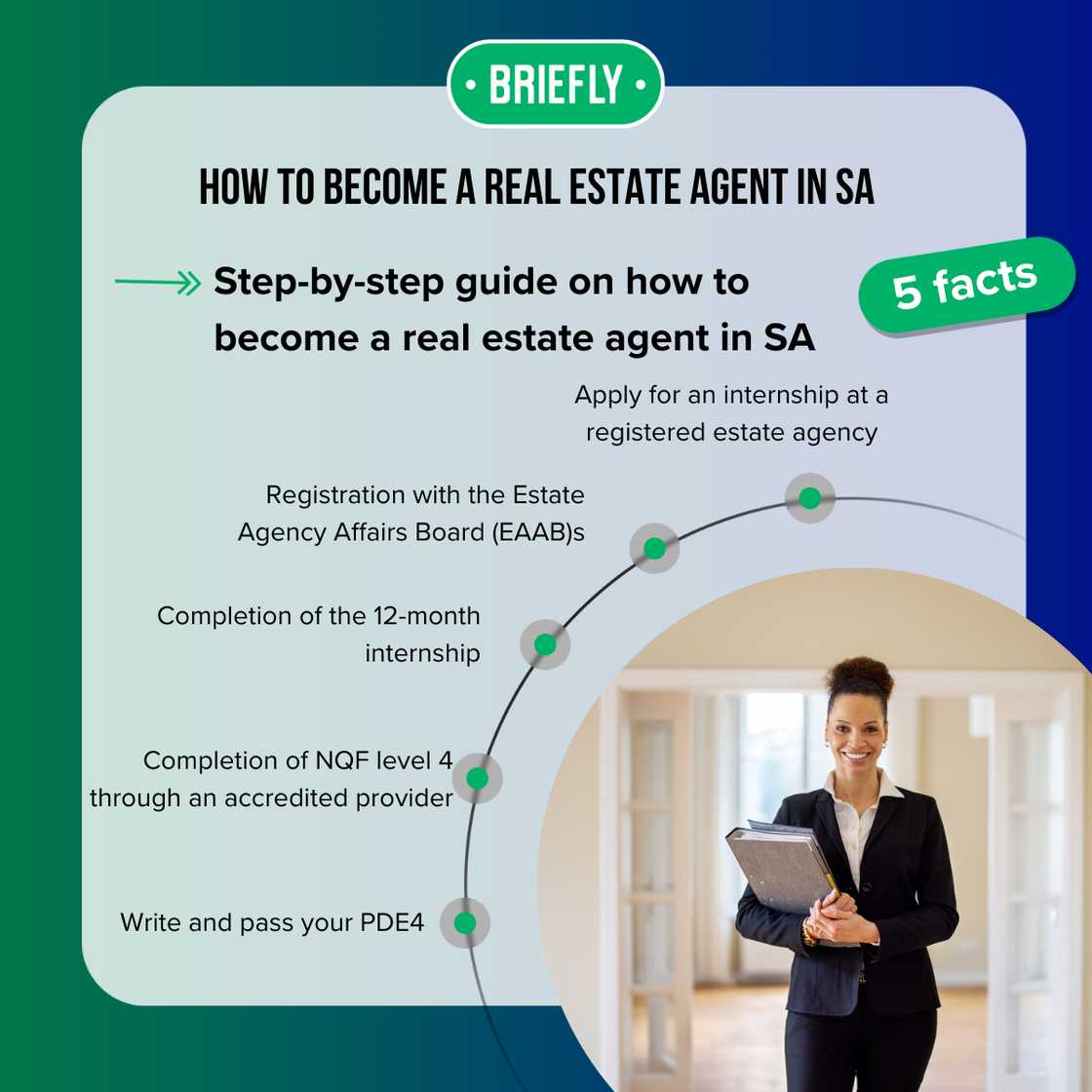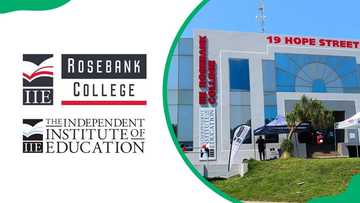How to become a real estate agent in SA: Step-by-step guide for 2024
A real estate agent is a licensed professional who helps clients buy, sell or rent properties, including homes, commercial buildings and land. Being a real estate agent in South Africa is one of the most lucrative professions you can pursue. This article highlights a simple step-by-step guide on how to become a real estate agent in South Africa.

Source: Getty Images
TABLE OF CONTENTS
- How to become a real estate agent in South Africa
- 1. Apply for an internship at a registered estate agency
- 2. Registration with the Estate Agency Affairs Board (EAAB)
- 3. Completion of the 12-month internship
- 4. Completion of NQF level 4 through an accredited provider
- 5. Write and pass your PDE4 (Professional Designate Exam)
- 6. Earning Continuing Professional Development (CPD) points
- Real estate agent requirements
- Who needs a real estate qualification?
- How many years do you have to study real estate?
- Do estate agents make money?
- How much money does a real estate agent make in South Africa?
- Can a foreigner be a real estate agent in South Africa?
- What are the definitions of terms used in real estate?
Real estate is a thriving industry in South Africa, with more opportunities than ever to get into this field. However, becoming a real estate agent is not as easy as it looks. It takes time, dedication, passion, patience and willingness to succeed. Here is what you need to know to become a real estate agent, including the steps involved.
How to become a real estate agent in South Africa
Choosing a career in real estate has the possibility of changing your life. The journey has not been easy for some, but the rewards have proven fruitful. One of the richest real estate agents, Rali Mampeule, said:
“My first job was dropping off real estate flyers in Johannesburg, so it wasn’t all a bag of roses.”
Mampeule’s ambition led him to open his estate agency at the age of 24, and he became a real estate typhoon with a billionaire financial status before the age of 40. Are you keen to choose a real estate agent career? Follow the steps below:
1. Apply for an internship at a registered estate agency
Anyone aspiring to enter the real estate industry must complete an internship as an estate agent. They must work under the guidance of a principal estate agent or a fully qualified estate agent who has held a valid fidelity fund certificate from the EAAB for at least three years.
A mentor-apprentice relationship is still required even if the intern or supervisor has other qualifications. The intern must undergo an interview before starting the internship.

Source: Original
2. Registration with the Estate Agency Affairs Board (EAAB)
Once an intern estate agent is hired, they must register with the Estate Agency Affairs Board (EAAB) to obtain their "intern" Fidelity Fund Certificate (FFC). The key requirements for registration with the EAAB include:
- A completed application form
- A certified copy of a valid ID
- A valid work permit (if not a South African citizen)
- Proof of registration payment
- An official employment letter, printed on company letterhead and signed by the principal agent of the firm
3. Completion of the 12-month internship
Anyone starting in real estate must complete a 12-month internship from the date they first receive their Fidelity Fund Certificate (FFC). This internship helps them gain the practical and theoretical knowledge needed to succeed. The following are essential real estate courses in the sector that must be covered practically:
Field | Description |
Law | Understanding property laws, contracts, and legal documentation |
Finance | financial transactions, property valuation, and investment strategies |
Administration | Handling administrative tasks and ensuring smooth office operations |
Paralegal Work | Supporting legal professionals with documentation and research |
Industry | Engaging in property development, construction, and project management |
Marketing | Promoting and selling properties through various marketing strategies |
Management | Overseeing property management and real estate operations |
The intern estate agent must also maintain a logbook documenting all completed activities. The principal, mentor, or supervisor must sign off on these activities and will offer guidance and logistical support throughout the internship.
Some of the activities recorded in the logbook, include completed listings, mandates negotiated, show houses arranged with registers, inspections done, and established property values.
4. Completion of NQF level 4 through an accredited provider

Source: Getty Images
After completing a 12-month internship and earning the FETC: Real Estate certification, a new agent is expected to have gained the same level of knowledge, skills, and expertise as someone who has been working in real estate for a significant amount of time.
To qualify as a full-status real estate property practitioner, you must demonstrate competence in the outcomes-based NQF Level 4 Real Estate course, which requires a Grade 12 pass. The NQF Level 4 qualification grants the intern 150 points, equivalent to 1,500 hours of training. This qualification takes around six months to complete and covers the following areas:
Area of study | Description |
Estate Agency Affairs Act and Code of Conduct | Understanding the regulations and ethical guidelines governing real estate agents |
Real estate products and services | Knowledge of various real estate products and services available in the market |
Legal environment-acts | Familiarity with the legal acts relevant to real estate |
Legal environment - contracts | Understanding the legal aspects of real estate contracts |
Understanding of Mortgage Bond | Knowledge of mortgage bonds and their implications |
Understanding of the Bond Registration Process. | Insight into the process of registering a bond |
Marketing and selling/leasing | Skills in marketing, selling, and leasing properties |
Estate agency management | Management practices within a real estate agency |
Agency administration and systems | Administrative and systemic operations of a real estate agency |
Paralegal environment | Basic paralegal knowledge relevant to real estate |
Financial process FICA/tax/accounting | Understanding financial processes, including FICA, tax, and accounting |
South African money laundering legislation | Knowledge of legislation related to money laundering in South Africa |
Requirements for NQF4 qualification
The criteria for the NQF 4 qualification are as follows:
- The candidate must demonstrate competence in the outcomes-based NQF Level 4 Real Estate qualification.
- 30% of study time must be in a classroom setting, while the remaining time is for self-study.
- The qualification must be completed within two years.
- A Portfolio of Evidence (PoE) is required.
5. Write and pass your PDE4 (Professional Designate Exam)

Source: Getty Images
The Professional Designation Examination (PDE) test combines knowledge and case studies for estate agents. After completing the NQF Level 4 course, candidates must pass the Professional Designation Examination (PDE4) to become certified as professional real estate agents.
According to the Education Regulations, full-status agent registration is only possible once the PDE4 has been successfully passed. Interns need to achieve 65% or higher in this exam. Upon passing, they can register as full-status estate agents and operate independently without needing mentor supervision.
6. Earning Continuing Professional Development (CPD) points
Like many other professions, real estate is continuously evolving. After becoming qualified, estate agents must earn annual CPD (Continuing Professional Development) points to renew their Fidelity Fund Certificate (FFC). This certification is essential for maintaining their status as registered property practitioners.
Real estate agent requirements
To become a real estate agent in South Africa, you must meet specific requirements. They include:
- A real estate intern should complete a 12-month internship where a professional agent trains them.
- During the internship, the intern must complete and maintain a detailed logbook of activities, which the supervisor or mentor supervising the internship must sign off on.
- The logbook is mandatory, and every intern must complete it without exception.
- The intern must attain their Further Education and Training Certificate (FETC) in Real Estate.
- Through this qualification, the intern earns 150 credits, corresponding to 1500 study hours, as notional hours, required to complete the course.
- The real estate interns can start the FETC NQF 4 qualification if they have only completed at least eight months of the 12-month internship.
- If the intern has a diploma or degree in FETC NQF 4, they can apply for exemption from the FETC.
- Once the real estate intern has been found competent in their NQF 4 portfolio of evidence, they must write and successfully pass the Professional Designate Exam (PDE).
- Once an intern has been issued a fidelity fund certificate (FFC), the intern has two years to complete the PDE level 4 successfully.
- No intern will be exempt from writing the PDE exam.

Source: Getty Images
Who needs a real estate qualification?
A real estate qualification is generally required for anyone who buys and sells properties as a profession, puts any property up for sale, or displays it for public viewing.
How many years do you have to study real estate?
According to RE/MAX of South Africa, the duration of your study for real estate in South Africa depends on the level of qualification you aim for. For instance, a real estate agent course such as a Bachelor of Science in Real Estate or Property Studies takes about three to four years of full-time study, while a diploma in real estate usually takes around two to three years.
Do estate agents make money?
Estate agents do make money. Their income primarily comes from commissions earned on property sales or rentals. The amount they make can vary widely based on various factors such as location and experience.
How much money does a real estate agent make in South Africa?
On average, a real estate agent's salary per month is estimated to be R14,808 by Indeed and R8,545 by PayScale. The pay varies with location, affiliated real estate agency, and type of property dealt in.
Can a foreigner be a real estate agent in South Africa?
According to the Property Practitioners Regulatory Authority, a foreigner can become a real estate agent in South Africa, but there are specific requirements and conditions to follow.
What are the definitions of terms used in real estate?
Here are some of the common definitions used in real estate:
- Education Regulations: The Standard of Training of Estate Agents Regulations
- EAAB: Estate Agency Affairs Board
- NQF Level 4: Further Education and Training Certificate
- NQF Level 5: National Certificate
- PDE: Professional Designation Examination conducted by the EAAB
- PDE 4: Professional Designation Examination for non-principal estate agents
- PDE 5: Professional Designation Examination for Principal Estate Agents
- FFC: Fidelity Fund Certificate issued by the EAAB validating legal trade in property
The real estate industry is dynamic and ever-evolving, with professional agents playing a crucial role in property transactions. If you are considering a new job, the real estate industry is rife with opportunities for self-motivated individuals looking for a financially rewarding career. Above is all you need to know about how to become a real estate agent in South Africa.
DISCLAIMER: This article is intended for general informational purposes only and does not address individual circumstances. It is not a substitute for professional advice or help and should not be relied on to make decisions of any kind. Any action you take upon the information presented in this article is strictly at your own risk and responsibility!
READ ALSO: How to get a letter of good standing: A step-by-step guide
Briefly.co.za recently published an article about how to get a letter of good standing. There are various letters of good standing, including a tender, foreign investment, tax clearance, COIDA, and emigration letters.
A COID letter of good standing is essential, just like a SARS letter of good standing. You cannot do business in SA without these documents. The South African Department of Labour and SARS have made the online application process for these documents straightforward.
Source: Briefly News









